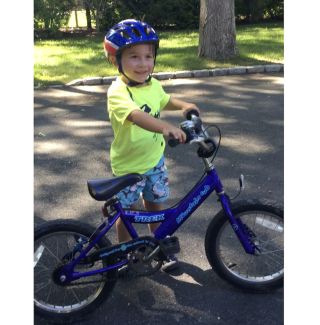Forgiveness
Are Moms to Blame When Their Kids Behave Badly?
A Personal Perspective: When a child’s best isn’t enough, many moms feel shamed.
Posted January 30, 2023 Reviewed by Devon Frye
Key points
- Moms are often blamed when their kids behave in unwelcome ways.
- Some kids suffer from complicated conditions that aren’t easily seen or understood.
- Kids who act out in school aren’t necessarily naughty. They might be struggling with ADHD, anxiety, autism, or an undiagnosed disease.
When I was pregnant, I planned to get an A+ in parenting. At the top of my to-do list was raising a courteous kid with exceptional character.
I did all the right things, and I expected results. I fed Marty the healthiest foods. I didn’t allow screens before he was two. I praised persistence, not outcomes.
“Great effort on that puzzle,” I said, pleased that he put pieces of a solar system together on the floor.
“It’s time for clean up,” I said. Marty gathered his toys.
In public, Marty was a charmer. He waited his turn. He didn’t grab other kids’ toys. He said “please” and “thank you.”
“Marty is smart and so well-mannered,” his teacher told us. “You’re raising him well.”
I kvelled. I was sure that “proper” parenting produced well-behaved kids who strove to succeed. Maybe for some people it does.
A Perfect Presentation
In my neighborhood, moms are under a lot of pressure to perform. We get standing ovations when children present well.
Often, motherhood feels more like a competitive sport than a group hug. Points are given to moms whose kids are sensations at math worksheets, test prep, and sitting still. Top-place finishers have teenagers who play travel soccer, win chess trophies, and go to the most-competitive schools.

I wanted to be in the winner’s circle, and, at first, I seemed to be on the right track.
“It’s time to go!” I said. Marty was at the door. He was on time for school, soccer, and piano lessons.
I posted pictures on Facebook and scrolled through social media, seeing many flawless families. Not many moms shared failures or fears.
Mothers are bombarded with unrealistic messages and social media posts that say they should have more, be more, and do more, said parent coach, Christ Prange-Morgan, who is a former therapist. “It's a never-ending cycle that bases our self-worth on what we have [or] how we look.”
Marty appeared to be a champ. I took responsibility. And when the situation changed, I couldn’t see straight.
Unexpected Behavior
As I wrote in this post, when Marty was 7, he complained about being tired. My little boy who had been quick to smile now scowled.
"I'm so sleepy," he said when he woke up.
He struggled to go to school.
I took him to the doctor. “My head feels weird,” he said. Nothing showed up in basic blood tests.
I consulted a child psychologist who urged me to be firm.
“Getting to school isn’t a choice,” she said. “You need to set him up for success.”
Some mornings I pulled him by the wrists. His body flopped on the floor. He crawled back to the bed. No matter the consequences, the daily transition to the front door didn’t happen.
What kind of mom can’t get her son to school?
I was told to stay calm. I couldn’t.
“Marty!” I screamed. “Make better choices!” I thought he had them to make.
When Our Best Isn’t Good Enough
Over the next two years, Marty became a part-time student, and I was a wreck.
On the days he made it to class, he couldn’t concentrate. Teachers were quick to tell me how unwilling he was.
“He doesn’t want to do his schoolwork.”
“He’s choosing not to follow the rules.”
My polite boy had become rude. All eyes were on me.
I turned to multiple experts who suggested different, evidence-based interventions that never worked.
I posted a mood meter in each room, but every glitch was still a catastrophe. I took away screens, but Marty didn’t care. Punishment hardly helped. Rewards weren’t motivating.
I canceled play dates and dreaded family gatherings. At a holiday celebration, Marty grabbed a boy’s gift.
“Marty,” I said. “That’s not yours. Give it back.”
“No!” he said and ran off. The mom glared at me. No need for words. I got the message that I didn’t measure up.
“Moms are vulnerable and sensitive about what other people think,” said Susan Newman, a social psychologist, author, and Psychology Today contributor. “Motherhood out of the gate is tough, and it becomes even harder if your child is having an issue.”
Marty’s behavior looked like willful disobedience, and everyone assumed it was the product of bad parenting. For a while, I believed them, and almost missed the real reason.

When “Bad” Behavior Is Misunderstood
Just before Marty's 10th birthday, I begged his doctor to be a detective.
The doctor took a deeper dive. We got a diagnosis I didn't expect. Marty had suffered from years of untreated celiac disease, an autoimmune disorder. Eating even the smallest amount of gluten (a protein found in wheat, barley, or rye) triggers an immune response that can affect the brain, mood, and behavior.
What made Marty tricky to diagnose was that he looked healthy. No one noticed the way immune cells in his brain disrupted his neurons’ ability to communicate. They just saw a kid behaving badly.
I started to see things differently.
Unwanted Behavior as a Sign of a Disorder
I reached out to dozens of moms across the country and heard the same story. For kids with disorders like attention-deficit/hyperactivity disorder (ADHD), anxiety, autism, or an autoimmune disease, unwanted or angry behavior results in a “bad mom” diagnosis.
“Julie” has a 6-year-old son “David” who is smart, kind, and energetic. He has ADHD, a neurological disorder that affects 10 percent of school-age kids.
In kindergarten, David grabbed toys from other children and knocked things over. His teachers said that David “chose to be naughty.” Julie felt “shrouded in shame” and “inadequate as a mom.”
“We see lots of misconceptions” when it comes to kids with conditions like ADHD, said Dr. Caroline Mendel, a psychologist in the ADHD and Behavior Disorders Center at the Child Mind Institute. “[There are] very real challenges that these kids are dealing with. We want parents and teachers to see [behaviors] as needs that need to be met.”
What looks lazy, oppositional, or disrespectful can be a child’s way of communicating that he or she isn’t able to behave or learn in an age-appropriate way.
That is what happened to "Vanessa’s" 11-year-old daughter, who is autistic. She tested into a gifted program but couldn’t stay calm. “Her anger was explosive,” Vanessa said.
Teachers called her daughter “manipulative,” and Vanessa felt like “public enemy number one” when she interacted with the teachers.
“You feel very judged,” she said.
“We have these narrow expectations and ideas for kids and behavior,” said Rachel Henes, a social worker and parent educator who works with schools and families. “If a kid meets expectations, they are considered a ‘good kid’ and if they don’t, they are seen as ‘a problem.’ Too often the burden gets put on moms to just fix ‘the problem,’ and that can leave the larger question of why the kid is struggling overlooked,” she explained.
I had chased the illusion that if I were a better mother, my son would have complied and behaved. When Marty got better, I realized how wrong I was.

Suddenly Perceived as a Successful Mom
It’s been a year since Marty knowingly ate gluten. Now, he gets to school and stays there. He’s added 15 pounds and grown two inches. He plays Wordle in three. He ends every conversation on the street with “Have a great day!”
He plays on his school basketball team. After a recent game, the mom of a teammate approached me.
“Every time I see Marty, he is smiling,” she said. “You’ve raised such a happy kid.”
A teacher he’s known for several years told me how different he acts in her class. “It’s remarkable,” she said. “You’re such a good mom.”
“I am a good mom,” I said. “But not because my son behaves.”
Summing It Up
Marty’s journey has forever changed mine.
If Marty had malignant cells, rather than celiac, he would have been praised as courageous, and I would have been brave. But because the biology that betrayed him was harder to see and understand, his behavior was misunderstood. And I was assessed as sub-par.
Sometimes, kids make bad choices because they don’t have better ones to make.
Now I call those kids courageous. I bet their moms are, too.




